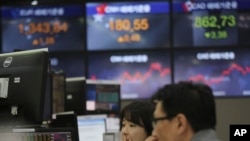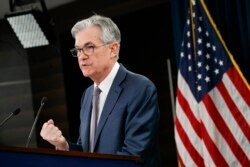European stock markets opened in positive territory Friday, but did not erase the previous session’s plunge triggered by the coronavirus pandemic.
London was up 3.4%, Frankfurt 2.1%, Paris gained 2.4% and Milan 4.5%.
The U.S. future indexes turned positive as the New York Federal Reserve Bank and Bank of Japan inject money into the financial system, indicating a gain when trading begins.
However, Asian markets plunged Friday because of a coronavirus panic sell-off, one day after Wall Street’s worst performance since the “Black Monday” crash of 1987.
Japan’s Nikkei 225 index closed down 6% after dropping as much and 10% in early trading. The index fell 16% this week.
Hong Kong’s Hang Seng Index fell 1.14% and lost more than 9% this week.
The benchmark Shanghai Composite Index dropped 1.23% to close the week with a loss of almost 5%. The Shenzhen Composite Index on China’s second exchange fell 1.08 %, a drop of about 6% for the week.
In Australia, the S&P/ASX 200 gained 4.4% after state and territorial leaders agreed to increase spending in face of COVID-19 outbreak.
Fed rally short-lived
In the United States, the Dow Jones Industrial Average fell 2,353 points Thursday — a 10% drop. The Standard & Poor's-500 and NASDAQ were also off 10%.
European markets were also hit hard. London was down 11% while major French and German indexes took a 12% hit.
Brazil’s Ibovespa index closed 15% lower.
Trading in New York was automatically stopped for 15 minutes when stock prices dropped like a stone shortly after the markets opened Thursday.
The markets rallied briefly after the Federal Reserve said it would ease what it called “highly unusual disruptions” in the usually reliable U.S. treasuries. But the optimism quickly went away.
Travel and airline stocks took the biggest hits and the price of oil dropped again, in part because less travel means less demand.
Recession fears
Analysts say the ever-growing list of closings, cancellations and restrictions because of the coronavirus means less consumer spending, a slower global economy, and investor fears of a recession.
But many financial experts say fear is what is driving the new bear market — fear of where the coronavirus is going to go next and warnings from the World Health Organization and U.S. experts that the pandemic is going to get worse before it gets better.
Advice from veteran investors include telling their clients to look for bargain-priced stocks and buy them — and consider investing in companies that can withstand global economic shocks, including insurance firms and manufacturers of consumer staples.






